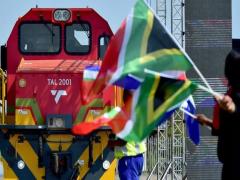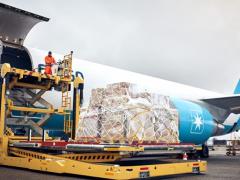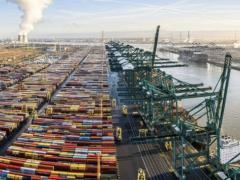DAVE GRAHAM CEO, SACO Shipping Invest in training LV: How can the transport sector attract and retain the skills it needs for the future? DG: The global logistics industry is faced with a much- publicised skills shortage, which is unfortunately all the more evident here in South Africa. The gap ranges from basic geography through to the finer skills needed within the freight forwarding industry, and while shippers are looking to their appointed agents to provide the necessary expertise to facilitate their imports and exports, the skills are often absent, leading to frustration and costly errors and delays. It is critical that logistics service providers invest in the education of their staff at all levels to improve service standards and the professionalism of the industry as a whole. Only by doing so will the industry attract and retain the young talent needed to remain competitive in an increasingly complex global market. BONGANI NGULELE Managing Director, 2020logistics E-commerce facilitates growth LV: What is the biggest opportunity you see for South Africa’s transport and logistics sector in the year ahead? BN: With expansion in global trade and e-commerce, there are many opportunities in the industry. The biggest one would be continuous growth in market share, employment opportunities and economic growth. The transport and logistics industry remains important because it continuously connects products to end users from manufacturing until delivery. RENKO BERGH Co-founder, CTRLFleet Seamless integration non-negotiable LV: How are innovation and technology shaping the way you do business in transport and logistics? RB: Transporters are starting to drive the technology topic in the supplier negotiations. Today, more than before, transporters are putting forward digital solutions in the form of track-and- trace solutions, electronic PODs and order creation via integrations to simplify and improve customer service. Integrating seamlessly is non-negotiable for operators to experience the full benefit of transport management software.HANS MODIPANE Executive: Commercial and Logistics, SA CARGO Staying customer centric with digital tools LV: How are innovation and technology shaping the way you do business in transport and logistics? HM: As supply chains become more complex and customer expectations rise, we have actively embraced digital tools to stay customer centric, resilient and competitive. Over the past few years, SA CARGO has invested in digital platforms that enable real-time data sharing with suppliers, customers and other stakeholders. The implementation of our stevedoring app at our ro-ro operation has allowed us to have real- time operational feedback, while for our transport and warehousing divisions we have adopted Transport Management Systems (TMS) and Warehouse Management Systems (WMS) which have allowed our business to better respond to disruptions, optimise routes and inventory management, and reduce operational costs. PAUL CUNLIFFE Managing Director, 4PL Cape Security a critical concern LV: What do you think are the most pressing challenges facing the transport sector right now and how should the industry respond? PC: Security! The incidence of unchecked criminal activity that drives up the cost of all supply chain operators, with insurance costs probably leading the pack. Customer education on the long-term benefits of improving own efficiency as opposed to forcing transport operators to reduce costs and turnaround times. Lastly, the demise of road infrastructure, which chases up operating costs, and ultimately pushes up costs for the consumer.
Driving change: industry leaders share insights
Comments | 0












